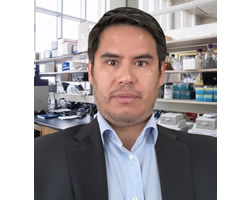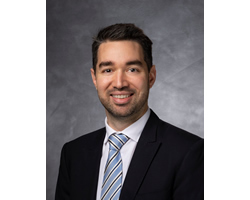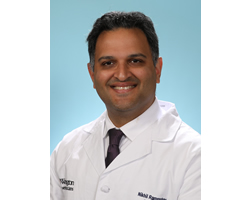
Sonia Grandi, PhD
Assistant Professor and Scientist
The Hospital for Sick Children; University of Toronto
Toronto, Ontario, Canada
Clinical – Thyroid and Pregnancy
“Levothyroxine Initiation for Subclinical Hypothyroidism in Pregnancy and Neurodevelopmental and Cardiometabolic Outcomes in Children (LEARN)”
Research Focus:
Dr. Grandi’s research focuses on evaluating the effects of levothyroxine treatment for women with subclinical hypothyroidism in pregnancy on neurodevelopmental and cardiometabolic outcomes in children using real-world data and target trial emulation.
Biography:
Dr. Sonia Grandi is an Assistant Professor and Scientist at The Hospital for Sick Children and the University of Toronto. Her work focuses on maternal-fetal health, pediatric outcomes, and large-scale, real-world data methodologies to evaluate clinical practices in endocrinology and pregnancy.

Arturo Mendoza, PhD
Assistant Professor
Boston University
Boston, Massachusetts, United States
Basic Science – Thyroid Hormone Effect and Metabolism
“Thyroid Hormone Action in Liver Fibrosis”
Research Focus:
Dr. Mendoza’s research focuses on the interplay between thyroid hormone receptor beta-1 (TRβ1) and lipid droplet metabolism in the liver to uncover novel therapeutic strategies for metabolic-associated steatohepatitis (MASH).
Biography:
Dr. Arturo Mendoza is a dedicated scientist specializing in life sciences, with a focus on cholesterol metabolism, lipid droplet physiology, and the mechanisms of lipotoxicity. His research explores the pathological mechanisms of non-alcoholic fatty liver disease (NAFLD) and non-alcoholic steatohepatitis (NASH), particularly the role of proteins such as CIDEC and CIDEA in apoptosis and the therapeutic potential of thyroid hormones in liver disease.
Dr. Mendoza is currently leading a research initiative supported by Boston University, aimed at unraveling the intricate connections between thyroid hormone signaling and liver fibrosis. His work applies advanced genetic models, including Thyroid Hormone Receptor Beta knockout mice, to investigate the metabolic and immunological pathways involved in NASH progression and treatment.
Beyond his research, Dr. Mendoza is committed to bridging scientific discovery with real-world application. His goal is to generate insights that can translate into novel therapeutic strategies. His work has been published in leading scientific journals, and he actively collaborates with peers in endocrinology and metabolic disease research.
With a strong foundation in both fundamental and translational science, Dr. Arturo Mendoza continues to drive innovation in metabolic health and strives to make meaningful contributions to the understanding and treatment of liver disease.

Anastasios Maniakas, MD, PhD
Assistant Professor
The University of Texas MD Anderson Cancer Center
Houston, Texas, United States
Basic Science – Thyroid Cancer (Non-Medullary)
“Decoding BRAF/MEK Resistance in Anaplastic Thyroid Cancer Through a Multi-Omic Longitudinal Interrogation of Resistance Pathways: A PDX Model Approach”
Research Focus:
Dr. Maniakas’s research focuses on exploring novel transcriptional changes and genetic mutations associated with BRAF/MEK inhibitor resistance in anaplastic thyroid carcinoma patient-derived xenograft models.
Biography:
Dr. Anastasios Maniakas is an Assistant Professor in the Department of Head and Neck Surgery at The University of Texas MD Anderson Cancer Center. He received his undergraduate, master’s, and doctoral degrees from McGill University, and his medical doctorate from the University of Montreal. He completed his residency at the University of Montreal, followed by a fellowship in head and neck surgical oncology at MD Anderson Cancer Center.
His clinical expertise includes head and neck cancers, with a focus on thyroid and parathyroid disease. Dr. Maniakas’s research interests center on translational research aimed at identifying and developing novel treatments for head and neck cancers. He leads preclinical and multi-phase clinical trials and co-leads trials evaluating minimally invasive treatments for advanced and recurrent head and neck cancers.
Additionally, Dr. Maniakas investigates the role of the microbiome in the development, progression, and recurrence of cancer in his patient population.

Nikhil Rammohan, BS, MSE, MD, PhD
Assistant Professor
Washington University School of Medicine in St. Louis
St. Louis, Missouri, United States
Clinical – Thyroid Cancer (Non-Medullary)
“Pulsed Stereotactic Ablative Radiotherapy (PULSAR) Combined With Targeted Systemic Therapy for Locally Advanced BRAF-V600E+ Anaplastic Thyroid Carcinoma”
Research Focus:
Dr. Rammohan’s research focuses on advanced imaging analytics in cancer, the evaluation of radiation-related toxicity, MRI-based radiomics, and stereotactic treatment of central nervous system and head and neck malignancies, including thyroid cancer.
Biography:
Dr. Nikhil Rammohan is an Assistant Professor of Radiation Oncology specializing in the treatment of central nervous system and head and neck tumors using external beam radiation therapy, Gamma Knife radiosurgery, and radiopharmaceutical therapy. He is subspecialized in the comprehensive treatment of thyroid cancer, including external beam radiotherapy and radioactive iodine therapy.
His research interests include radiotheranostics, MRI-based theranostics, and the use of artificial intelligence and radiomics to guide effective radiation therapy. During his PhD studies at Northwestern University, he developed theranostic nanoparticles for simultaneous MRI and chemotherapy. During residency training, he focused on advanced MRI techniques to improve radiotherapy outcomes for brain tumors and studied the effect of intracranial radiotherapy on healthy brain tissue.
He also investigated tumor white matter connectivity using diffusion-tensor MRI for glioma prognostication and developed an MRI surface-based deep-learning model to evaluate “brain aging” after intracranial radiation therapy.
For this proposal, he will lead a pilot clinical trial utilizing pulsed stereotactic ablative radiation therapy as an immunostimulant for treating BRAF-V600E mutant anaplastic thyroid cancer. Dr. Rammohan’s combined clinical and research experience with multimodal image-guided therapy positions him well to advance the goals of this project.

